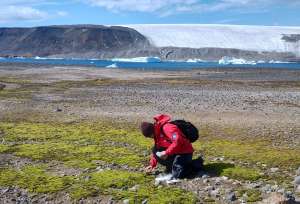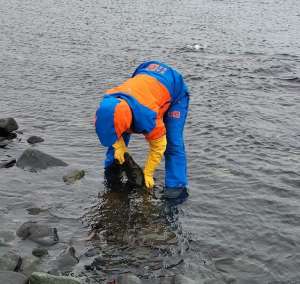The installation of biodiversity observatories and the collection of samples for genomic studies were some of the activities carried out this 2022-2023 Antarctic season by researchers from the BASE Millennium Institute on the white continent.
April 11, 2023.- At least 30 researchers from the Millennium Institute BASE were part of the LIX Antarctic Scientific Expedition (ECA 59) coordinated by the Chilean Antarctic Institute (INACH). From January to early March 2023, they carried out work in various areas of the Antarctic peninsula and the South Shetland islands.
Biodiversity observatories
In the area of Bahía Fildes, King George Island, a team led by the principal investigator of the Millennium Institute BASE, also the University of Magallanes, PhD. Karin Gerard, carried out the installation of the Autonomous Reef Monitoring Structure (ARMS) of the Marine Observatory. In addition, recordings were made with benthic sleds, sample collection with trawls and phytoplankton nets.
l’s teama Dra. Karin Gerard was made up of an academic from the Universidad Austral of Chile (UACh) and researcher at the Institute of Marine and Limnological Sciences (ICML), Vincente Villabolos; the academic of the University of Sorbonne and researcher of the Station Marine Concarneau of the National Museum of Natural History of France, PhD. Cyril Gallut; and the professional diver, Alberto Ahumada.
For its part, the team led by the PhD. Tamara Contador, an academic at the University of Magallanes and a researcher at the Millennium Institute BASE, the Cape Horn International Center (CHIC), and the Millennium Nucleus of Southern Invasive Salmonids (INVASAL), installed sensors to measure environmental parameters, and collected samples of freshwater and terrestrial invertebrates, in the area of Fildes Bay, Ardely Peninsula and Deception Island.
The installation of the sensors and the sampling were carried out within the framework of the Earth Observatory project together with the academic from the Catholic University of Maule, also an adjunct researcher at the Millennium Institute BASE and CHIC, PhD. Hugo Benítez.

Terrestrial ecology team
PhD. Tamara Contador and PhD. Hugo Benítez also carried out monitoring of fly populations Parochlus steinenii on King George Island, Deception Island and Nelson Island, sampling of Chicken branchinecta and Bockella poppei (within the framework of the postdoctoral project of the researcher affiliated with the Millennium Institute BASE, PhD. Claudia Maturana) and collection of the invasive fly Trichocera maculipennis on King George Island. In the places where they found populations of Parochlus steinenii, B. gainii and B. poppei, made chemical measurement of the lake water.
For her part, the doctoral student at the Millennium Institute BASE, Melisa Gañan, who was aboard the DAP Mares vessel Betanzos, surveyed the land in search of the winged fly Parochlus steinenii, associated with lakes and lagoons, and the wingless fly Belgium Antarctic, which is associated to a greater extent with mosses and terrestrial plants such as Deschampsia antarctica and Colobanthus quitensis.
Next to Melisa Gañan, ishad the undergraduate student at the University of Concepción (UdeC), Micaela Conejeros, who works together with the principal investigator of the Millennium Institute BASE, also a UdeC academic and director of the Biogeography, Macroevolution and Systematics Laboratory (BIOMAS) PhD. Pablo Guerrero. Micaela is dedicated to the search for vascular plants such as Deschampsia antarctica and Colobanthus quitensis.

Collection of lake samples and freshwater invertebrates
The PhD. Angie Díaz, academic at the University of Concepción (UdeC) and principal investigator at the Millennium Institute BASE, together with a doctoral student from the University of Chile, Sebastian Rosenfeld, sailed for 15 days on the DAP Mares vessel Betanzos. By means of diving and collecting on the coast, they obtained samples of marine invertebrates (echinoderms, molluscs and crustaceans) with the aim of generating a biodiversity inventory of the eastern sector of the Antarctic peninsula.
On the other hand, the doctoral student from the University of Chile and the Millennium Institute BASE, Diego Ahumada, dedicated himself to collecting water and sediment samples from 11 different lakes on King George Island, and measuring physicochemical parameters of the water (pH, temperature, dissolved oxygen, turbidity and conductivity) with the aim of studying the bacterial communities of this ecosystem. .
Collection of marine vertebrates
In the area of King George Island, UACh academics and researchers from the Millennium Institute BASE and the IDEAL Center, PhD. Luis Vargas- Chacoff and PhD. Kurt Paschke, together with the doctoral student from the UACh, Centro IDEAL and Millennium Institute BASE, Daniela Nualart, they collected adult fish (Antarctic Harpagifer) and amphipods (Gondogeneia antarctica, Cheirimedon femoratus and Gliptonotus antarcticus) for physiological studies. The team worked together with the Cont Anadromous Fish Research Center of United States, Steve McCormick, and the researcher from the University of Algarve in Portugal, Pedro Guerreiro.
PhD students from the University of Chile and the Millennium Institute BASE, Valentina Bernal and Francisca Rodriguez, also collected samples of Antarctic Harpagifer but in the larva stage and with the support of a bongo network on Greenwich Island, in order to carry out genomic studies.

Study of habitats and sampling for genetic analysis in Antarctic birds
ECA 59 also had the participation of undergraduate, master’s and doctoral students from the Instituto Milenio BASE, as was the case of the UACh doctoral student, also the IDEAL Center, Albert Palomino, and the undergraduate student from the Pontificia Universidad Católica de Chile (PUC) and the UC Molecular Biodiversity Laboratory (directed by PhD. Juliana Vianna), Elisa González, who camped for 70 days at Punta Armonía, Nelson Island. The objective of his stay was to carry out biological sampling, aerial and ground counts, and breeding and post-breeding tracking in chinstrap penguin colonies, under the leadership of the INACH and BASE Millennium Institute researcher, Dr. Lucas Krüger.
More members of the UC Molecular Biodiversity Laboratory team were also present at ECA59. In the vicinity of the General Bernardo O’Higgins base, Claudia Ulloa, a researcher from the Instituto Milenio BASE, along with PUC doctoral student Beatriz Esnard and PUC master’s student Eduardo Pizarro, carried out ecological monitoring studies in gentoo and chinstrap penguins. They carried out the installation of GPS and the obtaining of blood samples, with the aim of studying the use of the habitat by breeding penguins.
Likewise, the UCH doctoral researcher, Daly Noll; the doctoral student of the Andrés Bello University (UNAB), Lucila Morales; and the PUC undergraduate student, Josefina Jorquera; they collected samples of penguins, skuas and cormorants, during the 15 days they were sailing on the Betanzos vessel.

Works based Professor Julio Escudero
The principal investigator of the Millennium Institute BASE, also a researcher at INACH, PhD. César Cárdenas, remained for about 30 days in the place, carrying out tasks as Head of Base Professor Julio Escuderodel INACH, coordinating the logistical and scientific activities offurther of 12 projects developed during said period.
The doctoral student from the University of Chile, also the Millennium Institute BASE, Magdalena Osorio, Professor Julio Escudero also remained at the base of INACH. The purpose of his stay was to analyze the technical feasibility of being able to carry out his project during the next ECA60 and the logistical requirements to be able to carry out experiments in the aquariums of said base.
Main pictura: M. Institute BASE/ Hugo Benítez
